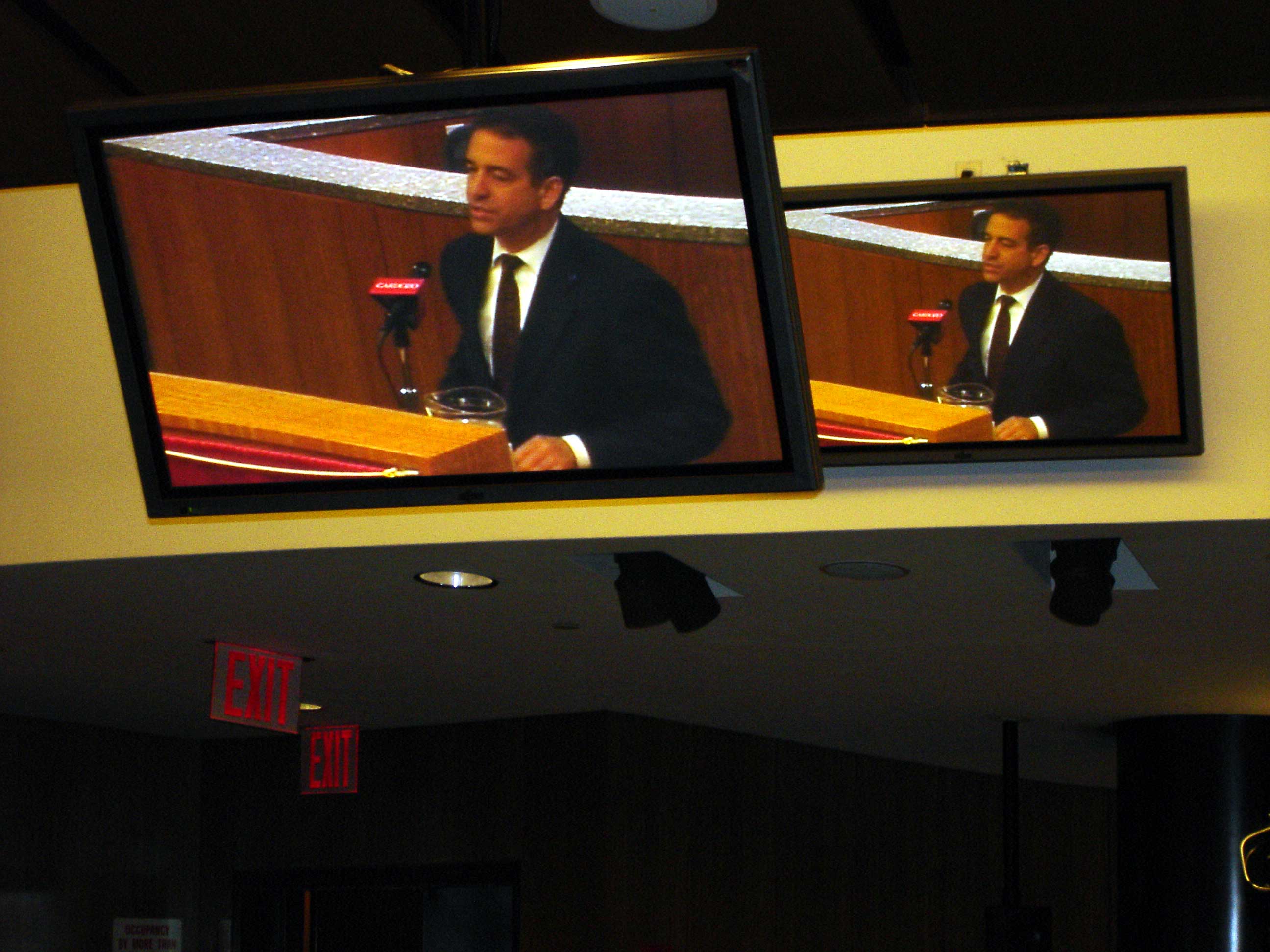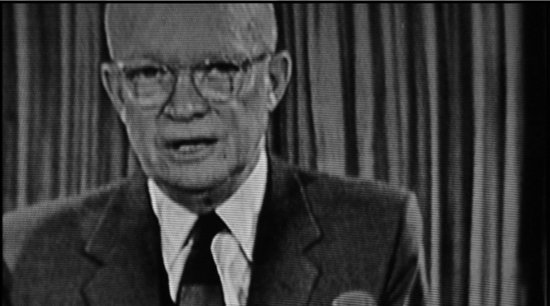With the first round of Operation Offset on its way to becoming law, Dubya submits a $2.8 trillion budget that further reflects the egregiously screwed-up priorities of this administration. The proposed budget “would cut billions of dollars from domestic programs ranging from Medicare and food stamps to local law enforcement and disease control while extending most of his tax cuts beyond their 2010 expiration date… [these] tax cuts, tax incentives and tax-cut extensions would cost the Treasury $1.7 trillion over the next decade, dwarfing the $172 billion in entitlement savings and proposed user fees in the budget.” Why didn’t anyone think of this before? Conducting war is so much easier when only the poorest Americans have to sacrifice. And as for the exploding deficits? Hoo boy. For an administration that purportedly cares about the unborn, this White House seems to have no qualms about foisting debt on the next generation.
Category: The Senate
Boehner’s Boys, Boehner’s Boondoggles.
“In the past, when these scandals have erupted, what’s happened is Congress has overreacted, and two days later nobody knew what happened…taking actions to ban this and ban that, when there’s no appearance of a problem, there’s no foundation of a problem, I think, in fact, does not serve the institution well.” No appearance of a problem?(!) New GOP Majority Leader John Boehner may have brought a new cadre of GOP leaders to the fore, but, when it comes to lobbying reform, they may as well be the Old Guard. And with Boehner, who has his own corporate masters, now actively working to prevent any real changes in lobbying practices, the fate of real reform may now lie in the hands of none other than Casino Jack: “If disgraced lobbyist Jack Abramoff drops the dime on a bunch of lawmakers and several of them are indicted, Congress won’t be able to say no to even the harshest anti-lobbying measures…But if Abramoff dawdles and not much happens, lawmakers will take their sweet time moving legislation through committee.”
The Fight Ahead.
“Not since 1994 has the party in power — in this case the Republicans — faced such a discouraging landscape in a midterm election…The result is a midterm already headed toward what appears to be an inevitable conclusion: Democrats are poised to gain seats in the House and in the Senate for the first time since 2000. The difference between modest gains (a few seats in the Senate and fewer than 10 in the House) and significant gains (half a dozen in the Senate and well more than a dozen in the House) is where the battle for control of Congress will be fought.” The WP previews the midterm electoral landscape. Excellent news…but still, if anyone’s shown an amazing capacity to spin gold into straw, it’s our current crop of Dems.
Casino Jack vs. the Gym Rats / The Boehner Blitz.
Behind closed doors, the Republicans talk amongst themselves about lobbying reform, with the status quo beating back a challenge by reformers to vote on new GOP leadership across the board (except for Hastert.) “‘All we were doing was asking us to look in the mirror,’ Rep. Daniel E. Lungren (R-Calif.), a co-sponsor of the motion, said after the vote. ‘The shadow of [Jack] Abramoff is not a mere distraction but a serious problem to address.’” Meanwhile, in the race for Majority Leader, while Blunt might be on the threshold of maintaining the DeLay ring’s hold over the House GOP, Boehner apparently proved himself no friend to reform either. Speaking on the GOP’s anti-lobbying package, he “scoffed that Congress knows how to do just two things well — nothing and overreact, according to witnesses.” And Boehner leads the candidates in former-staffers-turned-lobbyists.
But, give ’em credit — the GOP have at least succeeded in kicking lobbyists out of the House gym. “The rule change passed overwhelmingly, 379 to 50, but not before Democrats — and some Republicans — ridiculed it as meaningless. Rep. Barney Frank (D-Mass.) suggested that lawmakers compromise and change the rules so that lobbyists must yield to lawmakers who want to use the gym equipment they are on. ‘I’m a gym guy; I’ve never seen anybody lobbied there,’ said Rep. Jack Kingston (R-Ga.). ‘I’ve never seen any nefarious plots hatched on the treadmill.'” Just in case, though, Boss DeLay voted against the change.
Update: It’s Boehner on the second ballot over Blunt, 122-109. (Looks like the Shadegg-Boehner deal went through — On the first ballot, Blunt, who will remain Majority Whip, was only 7 votes shy of winning.)
Filibusted.
I already mentioned this in the Feingold post below, but it merits its own space: The brief Alito filibuster is already over, with nineteen Dems voting for cloture. There are a lot of blogs calling for the heads of the “Vichy Dems” right now, and, true, they’re not looking too good right now. But, frankly, neither is anyone else. The whole thing reeks of mismanagement and rank opportunism across the party.
I’m with Walter Shapiro: “In hindsight, the battle was effectively over after the first day of the Senate hearings when the criminally verbose Judiciary Committee Democrats failed to sustain a clear and consistent anti-Alito argument with all those cable networks broadcasting live. When politicians and interest-group leaders know that they are going to lose, they automatically retreat to a can-I-get-anything-out-of-the-wreckage calculus. So moderate senators from red states like South Dakota’s Tim Johnson decide that they can buttress their independent credentials with home-state conservatives by supporting Alito, since the outcome would be the same no matter how he voted. Groups like People for the American Way realize that shrill calls for a filibuster might preserve their fundraising base even if their years of urgent appeals to prevent a right-wing Supreme Court takeover failed to change a single Senate vote. And Kerry — whose late entry into the anti-Alito fray can be partly excused by his not serving on the Judiciary Committee — is also aware that such dramatic gestures help him maintain an up-to-date, ready-for-’08 e-mail list of Democratic activists.”
At any rate, the silver lining of this judicial nightmare (other than Judge Kennedy’s potential unpredictability) is that tomorrow, after Alito is voted through and Dubya gives his State of the Union, the GOP are officially out of good news. From tomorrow on, all the stories on tap, the continuing Iraq quagmire notwithstanding, are hearings and investigations — into the NSA wiretaps, into Abramoff, into Plamegate, into Katrina. So let’s pick ourselves up off the floor and get it together — We’ve got serious questions to ask of this administration, and, more importantly, we’ve got ourselves an election in nine months.
Big Russ.
With a tip-off from the Progressive Patriots Fund, I had the opportunity yesterday to catch Sen. Russ Feingold speak on the Patriot Act and the NSA wiretapping scandal over at Cardozo Law School. (Their pics are a lot better than mine — I forgot to charge my batteries, and thus only got in 2 or 3 shots before my camera died on me.) And how was he? Well, all-in-all, he came off as a convincing candidate for the election ahead, as well as an impressive, informed, and personable fellow. To be honest, I found his remarks a bit lawyerly (then again, he’s a lawyer speaking before a law school, so that’s not really a fair criticism), but, taken in full, he seemed a committeed progressive and a refreshingly candid leader, the type of dynamic, independent thinker the Senate should be teeming with, if the system came anywhere close to working these days.
The gist of Sen. Feingold’s remarks was thus: Al Qaeda is the central threat facing America and has been since 9/11. Yet, instead of bringing the nation together to eliminate this terrorist organization, the Dubya White House has chosen time and time again to endanger our national security and compromise our most fundamental American values for their own ideological or power-hoarding purposes. (Iraq, Guantanamo, extraordinary rendition, secret gulags, you name it.) Along those lines and as we now all know, the Patriot Act, which only Feingold voted against in 2001, contains some terrible provisions therein, the most notorious example affecting Middle America being Section 215 (which gives law enforcement, among other things, the right to see what you’ve been reading.)
Yet, as per the norm, Dubya has refused to admit that it’s even possible that something might be wrong with the Patriot Act now that it’s up for renewal — only that it’s necessary to defeat the evildoers and that any microscopic change in the statute could rend the fabric of freedom irreparably. (Despite this now-somewhat hoary ploy, Feingold and others have succeeded in blocking a permanent blanket extension for now, as y’all know if you’ve been visiting here lately.) And, of course, Dubya has taken this same tack of obfuscation and fear-mongering to cover up his brazen wiretapping power-grab — which, according to Congress’s own research arm, broke at least two laws and counting.
Again, this story is not news to many Dems out there, but Feingold laid it out in clear, comprehensible, and systematic fashion. (The only “breaking news” made was the Senator announcing this letter to Gonzales, asking him why he, in effect, lied to the Judiciary Committee during his confirmation hearings about the NSA wiretaps.) And he had some good lines throughout — In reply to Rove’s ridiculous claim that Dems were “pre-9/11”, Feingold quipped that the GOP suffered from a “pre-1776” mentality these days. (He also retold the recent Patrick Henry exchange.) To be honest, I’d liked to have heard more in this vein — In terms of breaking down the legislative legerdemain and legal issues at hand, Feingold was superb. But I thought the speech needed more narrative sweep and rhetorical grandeur, more explanation of why this battle matters so much to the workings of the republic. He doesn’t have to turn into Robert Byrd overnight. Still, I thought the remarks could have benefited from more dramatic heft and historical resonance: Jefferson, Madison, Adams, Lincoln, Wilson…they’re all relevant here. (Then again, as I said above, I was an historian sitting in a room full of lawyers, so I was a tougher sell than most.)
Along those lines, if there was a problem with this presentation, it’s that the Senator, while clearly outraged, at times seemed much less livid about all this than many in the audience, who occasionally sounded ready to hoist the black flag. (In fact, many will no doubt be happy to hear that Feingold was asked twice “why Democrats are so lame.” As he noted (and as the blogosphere can attest this week), if a crowd in New York City is this irate with the party, the Dems might be in serious trouble nationwide in November. Still, he also emphasized that the Democrats could be more effective fighters if they actually controlled a house of Congress — You can’t hold hearings if you’re in the minority.
In terms of other questions, Feingold said he supports and will take part in the very late-developing (and now already defunct) Alito filbuster (Roll Call.) In fact, he thought the Dems made a crucial mistake in capitulating to the original “Gang of 14” compromise, arguing cogently that Dems have seen nothing for it and may well have had the votes to win Catkiller‘s game of nuclear chicken. Since Casino Jack and lobbying reform seemed too big a subject to address competently in the time allotted, I asked him a question about his thoughts on the NYT decision to spike the NSA story for a year, his general view of the mass media’s performance in serving as a check on these types of executive abuses, and (’cause it seemed apropos) his thoughts on the burgeoning blogosphere’s role in all this. He didn’t really go after the Times decision, and said that, in terms of the recent Patriot Act debate, he thought the press had actually done an ok job. Regarding blogs, he called the Internet “a miracle for populist politics,” which was a good enough soundbite that everyone in my row dutifully wrote it down at the same time.
And, of course, Sen. Feingold was asked — a couple of times — whether or not he was running for President in 2008. Naturally, he played it coy — After all, we still have just under two years before the Iowa caucus. But, for what it’s worth, I was impressed by him — He’s not a first-class emoter like Edwards or Clinton, of course. Instead, he comes across as a highly intelligent, capable, and nuanced thinker, a la Bradley, Kerry, or Gore on his better days. But unlike those three, he also seemed much more comfortable in his own skin, more naturally himself at the podium, and — most importantly — more content to play the maverick if his lefty principles dictate thus. (Although, as I said, I’d like to see him tone down the lawyer-ese and rev up more Wellstone-ish fire if he does make a White House run.) I suppose there’s a small, bordering-on-infinitesimal chance that Rodham Clinton, Biden, Warner, or someone else might drop all the “New Democrat” protective camouflage this time around and begin loudly and undefensively proclaiming progressive principles to the Heavens. But, until that unlikely event, my candidate in the 2008 Democratic primary is Senator Russ Feingold of Wisconsin. (Update: 1776 link via Medley.)
Capitol Crimes.
“So what does real reform look like? There is no simple answer or silver bullet. If history is any judge, each round of ethics reforms lasts only a few years before lobbyists, lawyers and lawmakers pierce it full of holes. But ethics crusaders still hope to capitalize on this rare political moment, hurled forth on a powerful wave of corruption scandals plaguing the Republican Party.” Salon‘s Michael Scherer outlines five lobbying reforms that’ll determine whether Congress is serious about cleaning up the system in the wake of Casino Jack.
Fight Club.
“In the councils of government, we must guard against the acquisition of unwarranted influence, whether sought or unsought, by the military-industrial complex. The potential for the disastrous rise of misplaced power exists and will persist. We must never let the weight of this combination endanger our liberties or democratic processes.” That flaming liberal Dwight Eisenhower’s somber farewell address to the nation is the historical and thematic anchor for Eugene Jarecki’s documentary Why We Fight, a sobering disquisition on American militarism and foreign policy since 9/11. In essence, Why We Fight is the movie Fahrenheit 9/11 should have been. Like F911, this film preaches to the choir, but it also makes a more substantive critique of Dubya diplomacy and the 9/11-Iraq switcheroo, with much less of the grandstanding that marred Moore’s earlier documentary (and drove right-wing audiences berzerk.)
Sadly, the basic tale here is all-too-familiar by now. Ensconced in Dubya’s administration from the word go, the right-wing think-tank crowd (Wolfowitz, Perle, Kristol, etc.) used the tragedy of 9/11 as a pretext to enact all their neocon fantasies (spelled out in this 2000 Project for a New American Century report), beginning in Iraq. Taken into consideration with Cheney the Military-Contractor-in-Chief doling out fat deals to his Halliburton-KBR cronies from the Vice-President’s office, and members of Congress meekly signing off on every military funding bill that comes down the pike (partly because, as the film points out, weapons systems such as the B-1 or F-22 have a part built in every state), it seems uncomfortably clear that President Eisenhower’s grim vision has come to pass.
To help him rake this muck, Jarecki shrewdly gives face-time not only to learned critics of recent foreign-policy — CIA vet Chalmers Johnson, Gore Vidal (looking unwell) — but also to the neocons themselves. Richard Perle is here, saying (as always) insufferably self-serving things, and Bill Kristol glows like a kid in a candy store when he gets to talk up his role in fostering Dubya diplomacy. (Karen Kwiatkowski, a career military woman who watched the neocon coup unfold within the corridors of the Pentagon, also delivers some keen insights.) And, when discussing the corruption that festers in the heart of our Capitol, Jarecki brings out not only Charles Lewis of the Center for Public Integrity but that flickering mirage of independent-minded Republicanism, John McCain. (In fact, Jarecki encapsulates the frustrating problem with McCain in one small moment: Right after admitting to the camera that Cheney’s no-bid KBR deals “look bad”, the Senator happens to get a call from the Vice-President. In his speak-of-the-devil grimace of bemused worry, you can see him mentally falling into line behind the administration, as always.)
To be sure, Why We Fight has some problems. There’s a central tension in the film between the argument that Team Dubya is a corrupt administration of historical proportions and the notion that every president since Kennedy has been party to an increasingly corrupt system, and it’s never really resolved satisfactorily here. Jarecki wants you to think that this documentary is about the rise of the Imperial Presidency across five decades, but, some lip service to Tonkin notwithstanding, the argument here is grounded almost totally in the Age of Dubya. (I don’t think it’s a bad thing, necessarily, but it is the case.) And, sometimes the critique seems a little scattershot — Jarecki seems to fault the Pentagon both for KBR’s no-bid contracts and, when we see Lockheed and McDonnell-Douglas salesmen going head-to-head, for bidding on contracts. (Still, his larger point is valid — As Chalmers Johnson puts it, “When war becomes that profitable, you’re going to see more of it.“)
Also, the film loses focus at times and meanders along tangents — such as the remembrances of two Stealth Fighter pilots on the First Shot Fired in the Iraq war, or the glum story of an army recruit in Manhattan looking to turn his life around. This latter tale, along with the story of Wilton Sekzer, a retired Vietnam Vet and NYPD sergeant who lost his son on 9/11 and wants somebody to pay, are handled with more grace and less showmanship than similar vignettes in Michael Moore’s film, but they’re in the same ballpark. (As an aside, I was also somewhat irked by shots of NASA thrown in with the many images of missile tests and ordnance factories. Ok, both involve rockets, research, and billions of dollars, but space exploration and war are different enough goals that such a comparison merits more unpacking.)
Nevertheless, Why We Fight is well worth-seeing, and hopefully, this film will make it out to the multiplexes. If nothing else, it’ll do this country good to ponder anew both a president’s warning about the “disastrous rise of misplaced power,” and a vice-president’s assurance that we’ll be “greeted as liberators.”
“The Power-Madness of King George.”
 “This extremity of Bush’s position emerges most clearly in a 42-page document issued by the Department of Justice last week. As Andrew Cohen, a CBS legal analyst, wrote in an online commentary, ‘The first time you read the “White Paper,” you feel like it is describing a foreign country guided by an unfamiliar constitution.’ To develop this observation a bit further, the nation implied by the document would be an elective dictatorship, governed not by three counterpoised branches of government but by a secretive, possibly benign, awesomely powerful king.” As Dubya embarks on another weeklong campaign of fear and distortion (as per standard Rovian operating procedure), Slate‘s Jacob Weisberg gapes at the audacity of Bush’s brazenly unconstitutional ploy for power. “[I]n his white paper, Bush as much as declares: ‘I determine what my words mean and I alone determine what yours mean, too.’…Bush’s message to the courts, like his message to Congress, is: Make way, subjects.“
“This extremity of Bush’s position emerges most clearly in a 42-page document issued by the Department of Justice last week. As Andrew Cohen, a CBS legal analyst, wrote in an online commentary, ‘The first time you read the “White Paper,” you feel like it is describing a foreign country guided by an unfamiliar constitution.’ To develop this observation a bit further, the nation implied by the document would be an elective dictatorship, governed not by three counterpoised branches of government but by a secretive, possibly benign, awesomely powerful king.” As Dubya embarks on another weeklong campaign of fear and distortion (as per standard Rovian operating procedure), Slate‘s Jacob Weisberg gapes at the audacity of Bush’s brazenly unconstitutional ploy for power. “[I]n his white paper, Bush as much as declares: ‘I determine what my words mean and I alone determine what yours mean, too.’…Bush’s message to the courts, like his message to Congress, is: Make way, subjects.“
In related news, Senate opposition to the Patriot Act — All the Dems and only four measly Republicans — seems to be holding firm for now, meaning that the old, unrevised version will remain in effect for the time being. Of course, if King George actually possessed the powers he’s arrogantly allocated to himself of late, there would be no need for a Senate vote on the Patriot Act at all. Hopefully, Arlen Specter understands the danger in these breathtaking assertions of unconstitutional power by Dubya, and will make his forthcoming Senate Judiciary hearings count for something. After all, given this administration’s blatant power grab, it’s no longer hyperbole to say that our republic is at stake.
Don’t Need a Weatherman.
“I don’t think anybody anticipated the breach of the levees.” Really, Dubya? As Looka and the WP point out, two different government reports suggested the damage Katrina would cause to New Orleans in the days before it hit. “The NISAC paper warned that a storm of Katrina’s size would ‘likely lead to severe flooding and/or levee breaching’ and specifically noted the potential for levee failures along Lake Pontchartrain.. So, yet again, the president has lied to the American people and stonewalled congressional investigations into his actions. They used to call these impeachable offenses — Now, we call them Wednesday.







